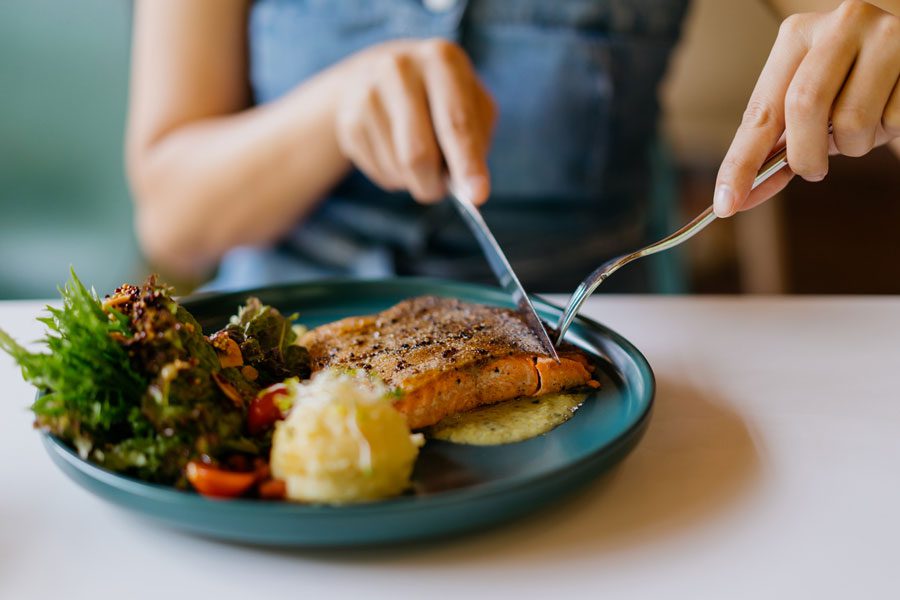This post builds on two previous blog entries about healthy eating in recovery. The first zeroed in on healthy approaches to breakfast and hydration. The second centered on quality choices when it comes to lunch and afternoon snacks. In this post, we will focus on dinner and late-night snacks.
We are dedicating an entire series to healthful eating because good nutrition is essential to your ongoing recovery from a substance use disorder. Nutritious food contributes to your physical health and your mental wellbeing—and those two things are foundational to your recovery. Think of it as a variation on that old saying, “You are what you eat.” We might put it this way: “Your recovery is fueled by what you eat.”
A reminder before we dive into dinner options: We are not nutritionists. For more specific advice and information about making great food choices, we recommend having a conversation with your doctor.
The Dinner Dilemma
You have probably had a frustrated conversation about what to have for dinner. Maybe you have that conversation all too often. One person asks, “What do you want for dinner?” The other replied, “I don’t know. Pick something you want.” The first person makes a suggestion. The second person rejects that suggestion. And round and round you go until you decide to eat leftovers or order in, or just grab a box of crackers or a bag of chips out of the cupboard.
And truthfully, you don’t even have to have a second person to find yourself caught in this cycle. You can simply go round and round with yourself until you give up. Either way, the likelihood that you will end up with less healthy choices goes up when you are just batting around various options until you exhaust your partner’s (or your own) patience.
To limit the frequency of this frustrating conversation, we suggest you consider planning—and even prepping—your meals in advance. Making a weekly list of what you will have for dinner each evening means you do not have to decide in the moment when you are hungry, tired, and maybe a little grumpy.
Developing some new skills in the kitchen can also help you lean into healthful choices. Whether you cook regularly, infrequently, or not at all, you can find easy recipes for nutritious and delicious evening meals. Skeptical? Let us get you started. Click for quick and easy dinner recipes and quick and easy dinner recipes for vegetarians.
When you use healthy ingredients—fresh fruits and veggies, lean proteins, whole grains, and more—you end up with healthy meals. And those meals support your recovery.
You can also support your recovery by sharing your evening meal with friends and family around a table, and with everyone’s phones put away. In our fast-paced world, this sort of dining experience builds relationships, provides some time for relaxation, and makes it easier to truly savor your food. All of those things—even if they strike you as old-fashioned—are great ways to firm up the foundation of your recovery.
Addressing the Midnight Munchies
Do you find yourself a little snack-ish just before bedtime? Plenty of people do—and they all too often pick snacks that are not terribly healthy and might even disrupt their ability to get the restful sleep they need. But a few adjustments can make your late-night snack something you can enjoy without guilt or risk to your rest.
The first thing to keep in mind is that the best time to eat a nighttime snack is about an hour before bedtime. As it would turn out, that is also an excellent time to power down your devices for the night. So you can build two healthy habits that support your sleep—and therefore your recovery—at the same time.
The second thing to remember is that you should avoid snacks that have significant amounts of caffeine or sugar or are spicy, heavy, or both. You want to turn to foods that provide nutrients that have been associated with promoting quality sleep—including magnesium, iron, zinc, omega-3 fatty acids, and protein. Good options include kiwi slices, peanut butter on whole grain toast, pistachios, and plenty more. Check out this list of good options for your last snack of the day.
Your Recovery is the Main Item on Our Menu
At Bel Aire Recovery Center—located near Wichita, Kansas—we help individuals who are struggling with substance use disorders and co-occurring mental health disorders. Our work is grounded in evidence-based practices as well as our years of experience, our up-to-date expertise, and our spirit of empathy. We provide personalized care in inpatient, outpatient, and virtual settings, and we are committed to helping you begin your recovery with confidence and momentum.
We are always ready to help you make a life-changing transformation. Let us help you scratch drugs and alcohol off of your personal menu so that you can reclaim your life and build a brighter future for yourself.




